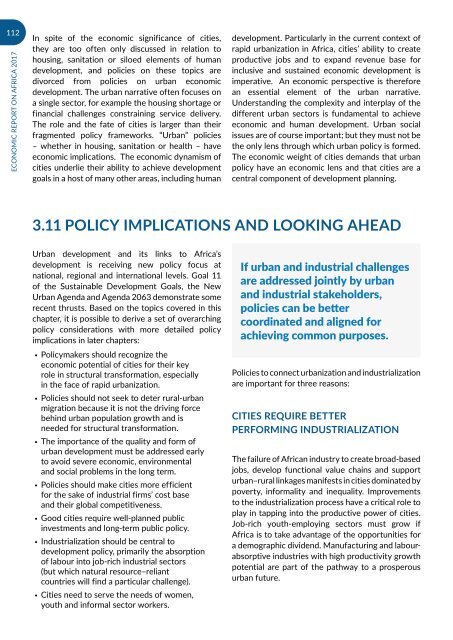URBANIZATION AND INDUSTRIALIZATION
Economic%20Report%20on%20Africa%202017%20UNECA
Economic%20Report%20on%20Africa%202017%20UNECA
Create successful ePaper yourself
Turn your PDF publications into a flip-book with our unique Google optimized e-Paper software.
112<br />
ECONOMIC REPORT ON AFRICA 2017<br />
In spite of the economic significance of cities,<br />
they are too often only discussed in relation to<br />
housing, sanitation or siloed elements of human<br />
development, and policies on these topics are<br />
divorced from policies on urban economic<br />
development. The urban narrative often focuses on<br />
a single sector, for example the housing shortage or<br />
financial challenges constraining service delivery.<br />
The role and the fate of cities is larger than their<br />
fragmented policy frameworks. “Urban” policies<br />
– whether in housing, sanitation or health – have<br />
economic implications. The economic dynamism of<br />
cities underlie their ability to achieve development<br />
goals in a host of many other areas, including human<br />
development. Particularly in the current context of<br />
rapid urbanization in Africa, cities’ ability to create<br />
productive jobs and to expand revenue base for<br />
inclusive and sustained economic development is<br />
imperative. An economic perspective is therefore<br />
an essential element of the urban narrative.<br />
Understanding the complexity and interplay of the<br />
different urban sectors is fundamental to achieve<br />
economic and human development. Urban social<br />
issues are of course important; but they must not be<br />
the only lens through which urban policy is formed.<br />
The economic weight of cities demands that urban<br />
policy have an economic lens and that cities are a<br />
central component of development planning.<br />
3.11 POLICY IMPLICATIONS <strong>AND</strong> LOOKING AHEAD<br />
Urban development and its links to Africa’s<br />
development is receiving new policy focus at<br />
national, regional and international levels. Goal 11<br />
of the Sustainable Development Goals, the New<br />
Urban Agenda and Agenda 2063 demonstrate some<br />
recent thrusts. Based on the topics covered in this<br />
chapter, it is possible to derive a set of overarching<br />
policy considerations with more detailed policy<br />
implications in later chapters:<br />
ҋҋ<br />
Policymakers should recognize the<br />
economic potential of cities for their key<br />
role in structural transformation, especially<br />
in the face of rapid urbanization.<br />
ҋҋ<br />
Policies should not seek to deter rural-urban<br />
migration because it is not the driving force<br />
behind urban population growth and is<br />
needed for structural transformation.<br />
ҋҋ<br />
The importance of the quality and form of<br />
urban development must be addressed early<br />
to avoid severe economic, environmental<br />
and social problems in the long term.<br />
ҋҋ<br />
Policies should make cities more efficient<br />
for the sake of industrial firms’ cost base<br />
and their global competitiveness.<br />
ҋҋ<br />
Good cities require well-planned public<br />
investments and long-term public policy.<br />
ҋҋ<br />
Industrialization should be central to<br />
development policy, primarily the absorption<br />
of labour into job-rich industrial sectors<br />
(but which natural resource–reliant<br />
countries will find a particular challenge).<br />
ҋҋ<br />
Cities need to serve the needs of women,<br />
youth and informal sector workers.<br />
If urban and industrial challenges<br />
are addressed jointly by urban<br />
and industrial stakeholders,<br />
policies can be better<br />
coordinated and aligned for<br />
achieving common purposes.<br />
Policies to connect urbanization and industrialization<br />
are important for three reasons:<br />
CITIES REQUIRE BETTER<br />
PERFORMING <strong>INDUSTRIALIZATION</strong><br />
The failure of African industry to create broad-based<br />
jobs, develop functional value chains and support<br />
urban–rural linkages manifests in cities dominated by<br />
poverty, informality and inequality. Improvements<br />
to the industrialization process have a critical role to<br />
play in tapping into the productive power of cities.<br />
Job-rich youth-employing sectors must grow if<br />
Africa is to take advantage of the opportunities for<br />
a demographic dividend. Manufacturing and labourabsorptive<br />
industries with high productivity growth<br />
potential are part of the pathway to a prosperous<br />
urban future.


